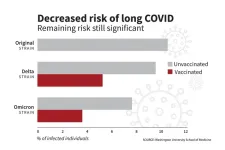(Press-News.org) A new collaboration between researchers from the Netherlands Institute for Neuroscience, the University of Amsterdam and the University of Chieti explores the neural substrates of blushing in a MRI scanner.
Most of us know what it feels like to blush. The face becomes warm and red, and we experience self-conscious emotions, such as embarrassment, shyness, shame, and pride. It is perhaps no wonder that Charles Darwin referred to it as “the most peculiar and the most human of all expressions”. But why do we blush, and what are the underlying mechanisms of blushing?
To answer this question, Milica Nikolic and Disa Sauter form the University of Amsterdam collaborated with Simone di Plinio from the University of Chieti under the supervision of Christian Keysers and Valeria Gazzola from the Netherlands Institute for Neuroscience.
“Blushing is a really interesting phenomenon because we still don’t know which cognitive skills are needed for it to occur”, developmental psychologist Nikolic explains. “There’s this idea in psychology that dates back to Darwin, who said that blushing occurs when we think about what other people think of us, which involves relatively complex cognitive skills”.
Blushing in a karaoke setting
The researchers investigated blushing by looking at the activated brain areas in an MRI scanner while measuring the cheek temperature—an indicator of blushing. Their participants were female adolescents, a group known to be particularly sensitive to social judgement. “It is known that blushing increases during this life stage, since adolescents are very sensitive to other people’s opinions and can be afraid of rejection or leaving wrong impression” Nikolic explains.
To evoke a blushing response in a controlled experimental setting, participants came to the lab for two separate sessions. During the first session, they were asked to sing purposefully-chosen difficult karaoke songs and, in the second session, they watched recordings of their own singing while their brain activity and physiological responses were measured.
Adding salt to the wound, they were also told that an audience would watch their recording with them. Finally, the participants were shown recordings from another participant who had sung at comparable level, and a professional singer who was disguised as a third participant.
The mechanism behind blushing
As expected, the researchers found that participants blushed more while watching their own recordings in comparison to other participants’ recordings.
The correlating brain areas were somewhat surprising. Blushing was associated with increased activity in the cerebellum, an area most known for its role in movement and coordination. “Lately, there has been a lot of research suggesting its involvement in emotional processing”, Nikolic adds. The researchers also found increased activation in the early visual areas, suggesting that the videos of own singing captured blushing participants’ attention the most.
Surprisingly, there was no activation in areas that are traditionally known to be involved in the process of understanding the mental state of oneself or others. “Based on this we concluded that thinking about others’ thoughts may not be necessary for blushing to occur” Nikolic concludes. “Blushing may be a part of the automatic arousal you feel when you are exposed and there is something that is relevant to the self”.
Universal phenomenon
Nikolic: “The next step would be to look at blushing under different conditions, or perhaps, even explore the phenomenon in younger children, before they have developed the cognitive skills to think about other people’s thoughts.”
“Blushing in itself is very interesting because it’s universal. There are even people who develop a phobia of blushing, for example, people with a social anxiety disorder. When we understand the mechanisms of blushing, we can target the fear of blushing better as well. Aside from that, it’s interesting to know more about blushing in a general sense as well, since it happens very often and is a common part of our everyday lives.”
Source: Proceedings of the Royal Society B
END
Singing the science: Using karaoke to examine blushing
2024-07-18
ELSE PRESS RELEASES FROM THIS DATE:
Data protection laws reduced breaches but affected firms’ value
2024-07-18
The introduction of new data protection rules significantly reduced breaches by firms but negatively impacted their market value, according to new research by the University of East Anglia (UEA) and University of Texas.
Researchers looked at what happened when the European Union’s General Data Protection Regulation (GDPR) started being enforced in 2018. Using its extraterritorial reach, the authors explore variation in US firms’ exposure to the EU GDPR to see how stricter data privacy laws affected their value, ...
Landmark study shows elevated cancer risk for women with endometriosis
2024-07-17
A landmark study from researchers at Huntsman Cancer Institute at the University of Utah (the U), the Spencer Fox Eccles School of Medicine at the U, and Boston University Chobanian & Avedisian School of Medicine found that women with severe endometriosis are 10 times more likely to get ovarian cancer, compared to women who do not have the disease.
Prior studies have shown a causal connection between endometriosis and ovarian cancer. But in using the Utah Population Database—a repository of linked health records housed at Huntsman ...
Lichtenberg earns GSA’s 2024 Donald P. Kent Award
2024-07-17
The Gerontological Society of America (GSA) — the nation’s largest interdisciplinary organization devoted to the field of aging — has chosen Peter Lichtenberg, PhD, ABPP, FGSA, of Wayne State University as the 2024 recipient of the Donald P. Kent Award.
This distinguished honor is given annually to a GSA member who best exemplifies the highest standards for professional leadership in gerontology through teaching, service, and interpretation of gerontology to the larger society. It was established in 1973 in memory of Donald P. Kent, PhD, for his outstanding leadership in translating research findings ...
Does the type of workstation you use make a difference in your health and productivity?
2024-07-17
It might be an exaggeration to claim that “sitting is the new smoking,” but significant research indicates that people who are sedentary face more health challenges than their active counterparts.
Office workers who spend most of their eight-hour workdays seated, for example, more often experience symptoms such as daytime exhaustion, hypertension and musculoskeletal discomfort than those who are less sedentary. Although devices such as standing desks have been found to alleviate physical symptoms and increase worker productivity, questions remain regarding the best use of the primary types of workstations—stand-biased, ...
Why the most prescribed chemotherapy drug can cause serious heart damage
2024-07-17
There’s still much to learn about how doxorubicin, a 50-year-old chemotherapy drug, causes its most concerning side effects. While responsible for saving many lives, this treatment sometimes causes cardiac damage that stiffens the heart and puts a subset of patients at risk for future heart failure. To better understand and potentially control such complications, Tufts University School of Medicine and Tufts Graduate School of Biomedical Sciences researchers have isolated the immune cells that become overactive when patients take doxorubicin. The team’s findings appear July 17 in the journal Nature Cardiovascular Research.
Doxorubicin ...
Cohen-Mansfield earns GSA’s 2024 Robert W. Kleemeier Award
2024-07-17
The Gerontological Society of America (GSA) — the nation’s largest interdisciplinary organization devoted to the field of aging — has chosen Jiska Cohen-Mansfield, PhD, FGSA, of Tel Aviv University as the 2024 recipient of the Robert W. Kleemeier Award.
This distinguished honor is given annually to a GSA member in recognition for outstanding research in the field of gerontology. It was established in 1965 in memory of Robert W. Kleemeier, PhD, a former president of the Society whose contributions to the quality of life through research in aging were exemplary.
The award presentation will take place at GSA’s ...
Barnes earns GSA’s 2024 James Jackson Outstanding Mentorship Award
2024-07-17
The Gerontological Society of America (GSA) — the nation’s largest interdisciplinary organization devoted to the field of aging — has chosen Lisa L. Barnes, PhD, FGSA, of Rush University Medical Center as the 2024 recipient of the James Jackson Outstanding Mentorship Award.
This distinguished honor is given annually and recognizes individuals who have exemplified outstanding commitment and dedication to mentoring minority researchers in the field of aging. It was renamed in 2021 in memory of James Jackson, PhD, FGSA, a pioneering psychologist ...
Although tiny, peatland microorganisms have a big impact on climate
2024-07-17
The Science
Polyphenols are a diverse group of organic compounds produced by plants. These compounds are often toxic to microorganisms. In peatlands, scientists thought that microorganisms avoided this toxicity by degrading polyphenols using an enzyme that requires oxygen. However, when there is little or no oxygen, like after flooding due to climate induced thawing, the enzyme is inactive, and polyphenols accumulate. This inhibits microbes’ carbon cycling. In this study, scientists mined data for thousands of microbial genomes recovered from Stordalen Mire, an Arctic peatland in Sweden. They discovered that these microorganisms used alternative polyphenol-active ...
Risk of long COVID declined over course of pandemic
2024-07-17
The risk of developing long COVID has decreased significantly over the course of the COVID-19 pandemic, according to an analysis of data led by Washington University School of Medicine in St. Louis.
Researchers attributed about 70% of the risk reduction to vaccination against COVID-19 and 30% to changes over time, including the SARS-CoV-2 virus’s evolving characteristics and improved detection and management of COVID-19.
The research is published July 17 in The New England Journal of Medicine.
“The research on declining rates ...
Learning from Venus: Combining earth system sciences with planetary sciences
2024-07-17
The University of Freiburg is establishing a new tenure track professorship in Earth and Planetary Geodynamics at the Faculty of Environment and Natural Resources, made possible by a 1.71 million euro grant from the Volkswagen Foundation. The new tenure track professorship is part of a comprehensive strategic initiative for combining Earth system sciences with planetary sciences at the University that also includes the establishment of a new Earth System Simulation Lab (EaSySim) and the introduction of an Earth Sciences ...




